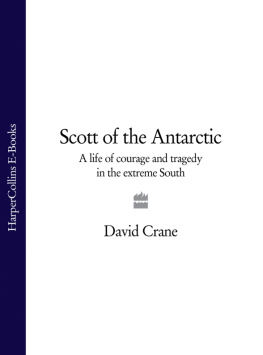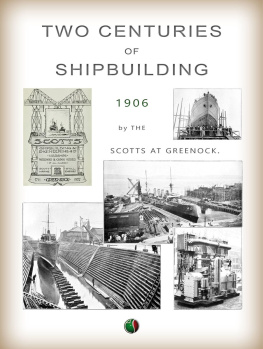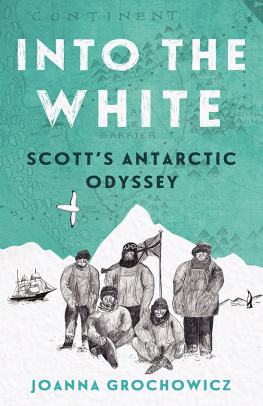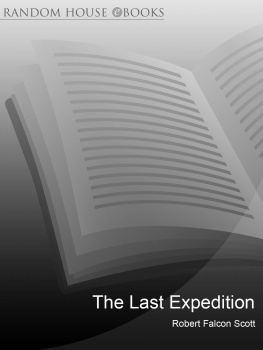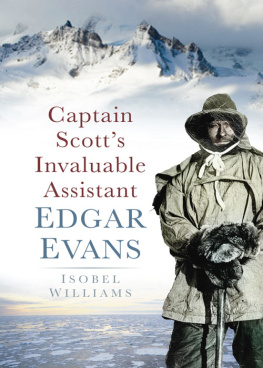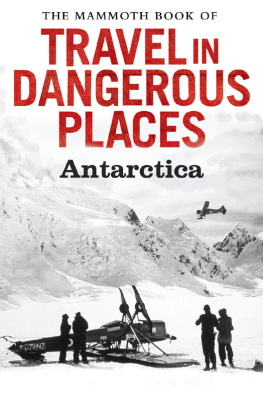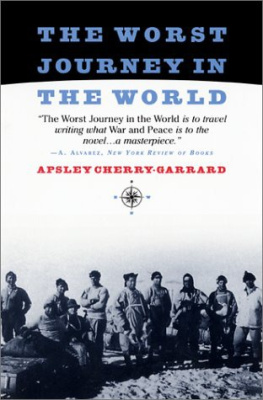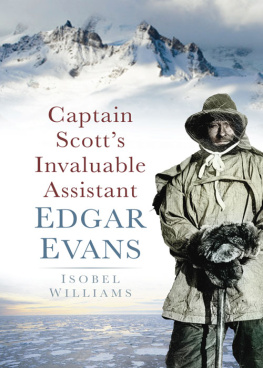OXFORD WORLDS CLASSICS
JOURNALS
ROBERT FALCON SCOTT was born in Devon in 1868, the third of six children in a prosperous family. He passed the Royal Navys entrance examination and joined the training ship HMS Britannia a month after his thirteenth birthday. Thereafter he rose steadily through the ranks until he was made a full lieutenant in 1889. In 1894 his father was declared bankrupt and died three years later; Scott was forced to help support his mother and unmarried sisters. He had been serving on HMS Majestic when Clements Markham appointed him as Commander of the National Antarctic Expedition 19014 on board the Discovery. The expedition brought him success and fame, and promotion to Captain. Stung by Shackletons march to within 100 miles of the South Pole in 1909, Scott organized a second expedition, and the Terra Nova set sail for the Antarctic in 1910. Beaten to the Pole by Amundsen, Scott and four of his companions died on their march back to safety in March 1912. Scotts gripping journals charting the expeditions progress and tragic end were first published in 1913 and remained in print for most of the century, an icon of national heroism.
MAX JONES was educated at Oxford, Cambridge, and the University of California at Berkeley. Formerly a Fellow and Director of Studies in History at Christs College, Cambridge, he is currently Programme Director of the MA in Modern British History at the University of Manchester. He is the author of The Last Great Quest: Captain Scotts Antarctic Sacrifice (2003).
OXFORD WORLDS CLASSICS
For over 100 years Oxford Worlds Classics have brought
readers closer to the worlds great literature. Now with over 700
titlesfrom the 4,000-year-old myths of Mesopotamia to the
twentieth centurys greatest novelsthe series makes available
lesser-known as well as celebrated writing.
The pocket-sized hardbacks of the early years contained
introductions by Virginia Woolf, T. S. Eliot, Graham Greene,
and other literary figures which enriched the experience of reading.
Today the series is recognized for its fine scholarship and
reliability in texts that span world literature, drama and poetry,
religion, philosophy and politics. Each edition includes perceptive
commentary and essential background information to meet the
changing needs of readers.

Great Clarendon Street, Oxford OX2 6DP
Oxford University Press is a department of the University of Oxford.
It furthers the Universitys objective of excellence in research, scholarship,
and education by publishing worldwide in
Oxford New York
Auckland Cape Town Dar es Salaam Hong Kong Karachi
Kuala Lumpur Madrid Melbourne Mexico City Nairobi
New Delhi Shanghai Taipei Toronto
With offices in
Argentina Austria Brazil Chile Czech Republic France Greece
Guatemala Hungary Italy Japan Poland Portugal Singapore
South Korea Switzerland Thailand Turkey Ukraine Vietnam
Oxford is a registered trade mark of Oxford University Press
in the UK and in certain other countries
Published in the United States
by Oxford University Press Inc., New York
Editorial matter Max Jones 2005
The moral rights of the author have been asserted
Database right Oxford University Press (maker)
First published as an Oxford Worlds Classics paperback 2006
All rights reserved. No part of this publication may be reproduced,
stored in a retrieval system, or transmitted, in any form or by any means,
without the prior permission in writing of Oxford University Press,
or as expressly permitted by law, or under terms agreed with the appropriate
reprographics rights organization. Enquiries concerning reproduction
outside the scope of the above should be sent to the Rights Department,
Oxford University Press, at the address above
You must not circulate this book in any other binding or cover
and you must impose this same condition on any acquirer
British Library Cataloguing in Publication Data
Data available
Library of Congress Cataloging in Publication Data
Data available
Typeset in Ehrhardt
by RefineCatch Limited, Bungay, Suffolk
Printed in Great Britain by
Clays Ltd, St Ives plc
ISBN 0199297525 9780199297528
1 3 5 7 9 10 8 6 4 2
ACKNOWLEDGEMENTS
WHILE preparing this edition for publication, I have benefited greatly from the assistance of many individuals and institutions. The commitment, patience, and astute comments of my editor, Judith Luna, proved invaluable throughout the process. Virginia Murray offered exemplary guidance through the papers of Scotts original publisher, Smith, Elder (now part of the John Murray Collection), helping to unearth a wealth of previously unpublished material which has enriched this edition. After I had worked through Scotts account of the polar journey, Francis Dodsworth meticulously compared Scotts base journals with the published version, presenting his findings with characteristic efficiency. Susan Bayly, Robert Blyth, Bob Headland, Rory Rapple, Shirley Sawtell, the Milton online discussion group, and, in particular, Gareth Rees and Beau Riffenburgh were generous with their expertise. Any errors which remain are, of course, my own. The team at OUP, including copy-editors Elizabeth Stratford and Edwin Pritchard, have done a fine job.
The John Murray Collection, Scott Polar Research Institute (SPRI), Alpine Club, Lord Kennet, and Lady Philippa Scott generously granted permission to reproduce copyright text and images in this edition. The staff at SPRI, the John Rylands University Library of Manchester, and the university libraries of Bristol and Cambridge, provided efficient support throughout, while William Frame and his colleagues at the British Library kindly arranged for me to consult Scotts original notebooks.
Both Christs College, Cambridge, and the new School of Arts, Histories, and Cultures at the University of Manchester provided wonderful environments to pursue research, and Penny Summerfields thoughts on diaries in particular helped shape the Introduction. I do not have space to list all the scholars who have assisted my work on Captain Scott over the years, but I am particularly grateful to David Cannadine, Peter Clarke, Klaus Dodds, Tom Laqueur, Tom Metcalf, and Jay Winter, while Peter Straus has helped me navigate the literary world. Final thanks, as always, to my parents, George and Diana, and to Sarah, Isabelle, and Oscar, for keeping me warm amidst the ice.
CONTENTS
, by Clements R. Markham
CHAPTER I
THROUGH STORMY SEAS
General StowageA Last Scene in New ZealandDepartureOn
Deck with the DogsThe StormThe Engine-room Flooded
Clearing the PumpsCape Crozier as a StationBirds of the
SouthA Ponys MemoryTabular BergsAn Incomparable
SceneFormation of the PackMovements of the Floes
CHAPTER II
IN THE PACK
A Reported IslandIncessant ChangesThe Imprisoning
IceSki-ing and Sledging on the FloesMovement of Bergs
Opening of the PackA Damaged RudderTo Stop or not to
StopNicknamesSki ExercisePenguins and Music
Composite FloesBanked FiresChristmas in the IceThe
Penguins and the SkuaIce MovementsState of the Ice-house
Still in the IceLife in the PackEscape from the PackA
CalmThe Pack far to the NorthScience in the Ice
CHAPTER III
LAND
Land at LastReach Cape CrozierCliffs of Cape Crozier
Landing ImpossiblePenguins and KillersCape Evans as Winter
StationThe Ponies LandedPenguins Fatuous Conduct
Adventure with Killer WhalesHabits of the Killer Whale
Next page

